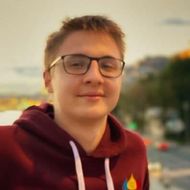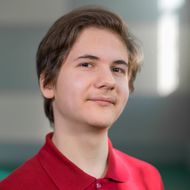HSE University Students Win Prizes at the International Mathematics Competition for University Students

The 29th International Mathematics Competition for University Students (IMC 2022) took place in early August in a mixed format in Blagoevgrad (Bulgaria) and online. Eight students of the HSE Faculty of Computer Science and the HSE Faculty of Mathematics won prizes at the competition.
IMC features problems in algebra, mathematical analysis, geometry, and combinatorics. Students under 23 are eligible for participation.
The HSE University students demonstrated the following achievements:
Grand First Prize
Daniil Ivanik, third-year bachelor’s student of Applied Mathematics and Information Science, HSE Faculty of Computer Science (FCS)
First Prize
Fedor Kuyanov, second-year bachelor’s student of Applied Mathematics and Information Science, FCS
Alikhan Zimanov, second-year bachelor’s student of Applied Mathematics and Information Science, FCS
Temirkhan Zimanov, second-year bachelor’s student of Applied Mathematics and Information Science, FCS
Mikhail Petrov, third-year bachelor’s student of Applied Mathematics and Information Science, FCS
Mikhail Gorbunov, second-year bachelor’s student of Applied Mathematics and Information Science, FCS
Anastasiia Zhilina, second-year bachelor’s student of Mathematics, HSE Faculty of Mathematics
Second Prize
Danila Ivanov, third-year bachelor’s student of Applied Mathematics and Information Science, FCS
The winners shared their impressions of IMC 2022.
Daniil Ivanik

I must admit, it was nice to add a new achievement to our Faculty of Computer Sciences’ collection. But at first, I doubted whether to take part in this year’s IMC or not. I’m not that young anymore, and I thought maybe I should have given way to younger participants. But I’m addicted to the euphoria of having solved a beautiful mathematical problem. I decided to participate and did not regret it—during the competition, I found a really aesthetically pleasing solution to a problem. The other problems were more technical. For the fact that I solved them, I am particularly grateful to my school and university teachers.
Fedor Kuyanov

It felt like this year’s IMC problems were easier than last year’s ones—particularly in the second round, where we only needed methods we studied during the first year of university. Most of the problems were from discrete mathematics and linear algebra—the fields of maths I like the most.
See also:
HSE Scores Best Results among Russian Universities at International Olympiad in Uzbekistan
At the Third Al-Khorezmi International Mathematical Olympiad (AKHIMO), held at Urgench State University in Uzbekistan, students from HSE University's Faculty of Computer Science scored best results among participants from Russian universities. The olympiad also featured contestants from Brazil, the USA, China, India, South Korea, Malaysia, Japan, Vietnam, Serbia, Kyrgyzstan, Kazakhstan, Tajikistan, Turkey, Turkmenistan, and Uzbekistan.
Russian Scientists Assess Dangers of Internal Waves During Underwater Volcanic Eruptions
Mathematicians at HSE University in Nizhny Novgorod and the A.V. Gaponov-Grekhov Institute of Applied Physics of the Russian Academy of Sciences studied internal waves generated in the ocean after the explosive eruption of an underwater volcano. The researchers calculated how the waves vary depending on ocean depth and the radius of the explosion source. It turns out that the strongest wave in the first group does not arrive immediately, but after a significant delay. This data can help predict the consequences of eruptions and enable advance preparation for potential threats. The article has been published in Natural Hazards. The research was carried out with support from the Russian Science Foundation (link in Russian).
'The Six Handshakes Rule Applies to Social Media'
Ivan Samoylenko specialises in graph theory; in his third year of university, he developed an idea that later became the foundation of a highly cited academic article. In this interview with the HSE Young Scientists project, he speaks about the Watts-Strogatz small-world model, being a performer in the Bolshoi Children's Choir, and making the choice between science and industry.
‘HSE Is a Very Good Place: Intelligent Students, a Strong Teaching Staff’
Since March 2025, the HSE Faculty of Mathematics has welcomed a leading Russian mathematician, Doctor of Physical and Mathematical Sciences, Honorary Professor at the University of Edinburgh, National Professor of China, and recipient of the Lyapunov Prize—Sergey Kuksin. In an interview with the HSE News Service, he spoke about the role of the individual in mathematics, KAM theory, and why analysis is so relevant today.
Scientists Disprove Bunkbed Conjecture
Mathematicians from Russia, including two HSE graduates, have disproven a well-known mathematical conjecture that, despite lacking solid proof, had been considered valid for 40 years. The ‘Bunkbed Conjecture’ belongs to percolation theory—a branch of mathematics that studies the formation of connected structures in independent environments.
'Our Mathematics Is for Far-Reaching Minds'
Anna Presnova focuses on automatic control theory, a branch of science that addresses global problems. In this interview with the HSE Young Scientists project, she talks about her aspiration to achieve practical results, the energy she gains from teaching, and why she would be interested to meet with Alexandr Lyapunov, founder of stability theory.
'It Was a Great Learning Experience for the New Generation of Mathematicians'
From November 5 to 9, 2024, HSE University hosted a five-day conference on algebraic geometry and mathematical physics, organised jointly with the Beijing Institute of Mathematical Sciences and Applications. Over 30 mathematicians from the world's leading universities, including early-career scientists, participated in the event.
HSE University Wins Two Medals at the International Mathematics Competition for University Students
Two students, one graduate and one undergraduate, from the HSE Faculty of Computer Science (FCS) programme in ‘Applied Mathematics and Information Science’ won prestigious awards at the International Mathematics Competition for University Students (IMC). Graduate Maksim Kazadaev and first-year student Daria Linichenko both represented HSE University at the IMC, winning gold and silver medals respectively.
Prepare for the INTO HSE Olympiad with HSE Students
Winners of the INTO HSE International Maths Olympiad receive scholarships and admission offers to 37 different programmes at HSE University. Angelina Yudina, a master's student and invited instructor of maths at the Faculty of Economic Sciences, offers a video lesson where she analyses the demo version of the maths problems from the Olympiad.
Immortal Cells and Mathematics Reveal Mechanism behind Coronavirus Infection
A mathematical model has helped describe the course of infection caused by two variants of coronavirus: Omicron and Delta, and explain the differences between them. It appears that the cell entry rate is lower for Omicron, allowing infected cells ample time to alert neighbouring cells of the threat and trigger the activation of their innate immune response. In the future, the developed model could be employed to investigate any other variant of COVID-19, potentially leading to effective strategies for combating new hazardous strains, such as Pirola and JN.1. The findings from the study conducted with the participation of HSE researchers have been published in PeerJ.


